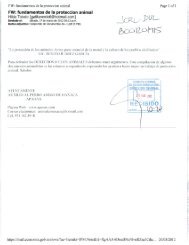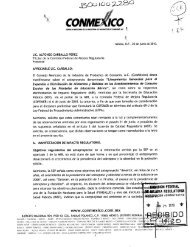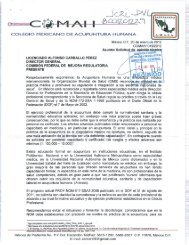Untitled
Untitled
Untitled
Create successful ePaper yourself
Turn your PDF publications into a flip-book with our unique Google optimized e-Paper software.
S116<br />
In summary, despite a substantial amount of research, the<br />
relationship of dietary fibre intake with the development of<br />
colorectal cancer is not well understood, and we conclude<br />
that high intakes of dietary fibre possibly reduce the risk for<br />
colorectal cancer.<br />
Several mechanisms which might explain a protective<br />
effect of fibre have been proposed; dietary fibre might reduce<br />
the risk for colorectal cancer by increasing the speed of<br />
transit of food material through the large intestine, by<br />
fermentation to short-chain fatty acids which may promote<br />
cell differentiation, induce apoptosis and/or inhibit the<br />
production of secondary bile acids by reducing luminal pH,<br />
or by other mechanisms (Hague et al., 1995; Nagengast et al.,<br />
1995; Potter, 1999).<br />
Some studies have investigated whether consumption of<br />
whole grains rather than refined grains is associated with a<br />
relatively low risk for colorectal cancer. In a review and metaanalysis<br />
in 1998, Jacobs et al. (1998) concluded that the<br />
evidence from case–control studies supported the hypothesis<br />
that a high intake of whole grains reduces the risk for<br />
colorectal cancer. However, the Pooling Project of Prospective<br />
Studies of Diet and Cancer showed no significant<br />
association between whole grain intake and the risk for<br />
colorectal cancer (Park et al., 2005).<br />
Cancer of the liver and biliary tract<br />
The major causes of liver cancer (hepatocellular carcinoma)<br />
include hepatitis viruses, cirrhosis, liver flukes and aflatoxins<br />
(WHO, 2003b; Bosch et al., 2005). Carbohydrates are not<br />
thought to be directly relevant to the aetiology of this<br />
cancer, although under poor storage conditions some staple<br />
foods such as maize and rice, which are rich sources of<br />
carbohydrates, can become contaminated with aflatoxins<br />
produced by aspergillus.<br />
For cancer of the biliary tract, Zatonski et al. (1997)<br />
reported in a case–control study that a high intake of<br />
carbohydrates was associated with a substantial increase in<br />
risk; however, this might reflect dietary changes due to longstanding<br />
symptoms of gallbladder disease. There are few<br />
other data on the possible role of carbohydrates in the<br />
aetiology of this cancer, and no conclusions can be drawn<br />
(Pandey, 2003).<br />
Cancer of the pancreas<br />
The only well-established risk factor for cancer of the<br />
pancreas is smoking (Lowenfels and Maisonneuve, 2005).<br />
Chronic pancreatitis and type-II diabetes are associated with<br />
pancreatic cancer (Michaud, 2004; Huxley et al., 2005) but<br />
some uncertainties remain as to whether these represent<br />
largely causal associations or whether these non-malignant<br />
conditions are sometimes due to the presence of early<br />
pancreatic cancer. The role of diet in the aetiology of this<br />
cancer is not well understood. Obesity is weakly positively<br />
associated with risk (Berrington de Gonzalez et al., 2003), but<br />
European Journal of Clinical Nutrition<br />
Carbohydrates and cancer<br />
TJ Key and EA Spencer<br />
no other dietary risk factors have been confirmed. Based on<br />
the association with diabetes, it has been proposed that the<br />
risk for cancer of the pancreas may be increased by a diet<br />
with a high glycaemic load and by impaired glucose<br />
tolerance, insulin resistance and hyperinsulinaemia. Three<br />
prospective studies have examined the associations of sugar,<br />
sugar-sweetened soft drinks, glycaemic index and glycaemic<br />
load with the risk for pancreatic cancer: sucrose itself was not<br />
associated with risk and the results for glycaemic index and<br />
load were inconsistent (Michaud et al., 2002; Johnson et al.,<br />
2005; Silvera et al., 2005a), whereas there was some evidence<br />
that risk increased with a high intake of sugar-sweetened soft<br />
drinks in women (Schernhammer et al., 2005). Case–control<br />
studies have suggested that high intakes of dietary fibre<br />
might reduce risk (World Cancer Research Fund, 1997), but<br />
few data are available from prospective studies (Stolzenberg-<br />
Solomon et al., 2002). There are insufficient data to draw any<br />
conclusions.<br />
Lung cancer<br />
Most cases of lung cancer are caused by smoking. The<br />
possibility that diet might also have an effect was raised by<br />
studies in the 1970s (Key et al., 2004). Subsequent research<br />
has focused on fruit, vegetables and related micronutrients,<br />
with little attention given to carbohydrates. No dietary<br />
effects on lung cancer have been established, and the weak<br />
associations between some dietary factors and risk observed<br />
in many studies might be due to residual confounding by<br />
smoking.<br />
Breast cancer<br />
The established risk factors for breast cancer are hormonal<br />
and reproductive factors (Key et al., 2003). Risk among<br />
postmenopausal women is increased by obesity (van den<br />
Brandt et al., 2000), probably because obese women have<br />
relatively high oestrogen production due to synthesis in the<br />
adipose tissue from androgen precursors (Endogenous<br />
Hormones and Breast Cancer Collaborative Group, 2003).<br />
In relation to carbohydrates, it is possible that high intakes<br />
of sucrose or high glycaemic load might increase risk by<br />
leading to obesity (see van Dam and Seidell, 2007) which<br />
causes an increase in endogenous oestrogen levels, while it is<br />
possible that high intakes of fibre might reduce risk, perhaps<br />
by interrupting the entero-hepatic circulation of oestrogens<br />
and therefore reducing oestrogen levels in the breasts (Key<br />
et al., 2003).<br />
Sucrose. Few studies have investigated the association<br />
between sucrose consumption and breast cancer risk. In<br />
previous reviews it was concluded that the little evidence<br />
available was inconsistent and therefore that no judgement<br />
was possible (World Cancer Research Fund, 1997) or that<br />
although there was some suggestion of a small increase in<br />
risk of breast cancer in association with a high consumption
















